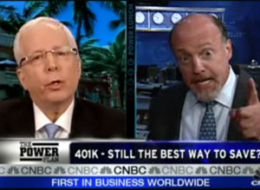A Reuters article I tweeted this morning bears the intriguing title (and assertion) that “There are no pure index investors.”
The key passage is this one:
The big lie about being an index investor, however, is that it is possible to be one in a pure sense, as opposed to an investor who uses indexing as a tool. There are no pure indexers: everyone, like it or not, is an asset allocator, or asset picker if you prefer.
As I noted here last week in Core & Expore Redux, I certainly agree there are very few “pure” indexing investors, whether they use index mutual funds or ETFs (exchange-traded funds). Even if average retail investors “get” the idea of low-cost passive asset-class investing, most of them still tend to mix it up with both indexing and individual securities. This is a strategy called “Core and Explore.” Preet Banerjee wrote an excellent story on this last year in MoneySense magazine.
There are pure indexing purists and pundits

However, as I also said at the Motley Fool — Is it Possible to Successfully Blend Stock-Picking and Indexing? — I think there are many indexing “purists” among some financial advisers who “get it.” These tend to be authors and/or pundits who are committed to indexing as a consistent philosophy. Here I’m thinking of authors like Dan Solin or Andrew Hallam, who articulate their philosophies in such books as Solin’s The Smartest Money Book You’ll Ever Read (and others in his “Smartest” series) or Hallam’s Millionaire Teacher. In his book and articles, including one at MoneySense, Hallam memorably describes how he weaned himself off such futile activities as market timing and stock-picking.
Even Jim Cramer says some should index
I find it amusing that even Jim Cramer in his daily Mad Money TV show — he’s the epitome of the belief in stock-picking and the antithesis of Solin — tells viewers who have neither the time nor the energy to pick stocks that they should just stick with an S&P 500 index fund or ETF.
The Reuters piece also touches on a point that has long intrigued me: a global one-stop portfolio, which it describes “only as an idea.” I have long asked the question why the mutual fund industry’s much-ballyhooed “Global Balanced Funds” would not be the only fund you’d need?
Will robo-advisers succeed where global balanced funds did not?
In theory, such one-stop-shopping funds should do what the newer robo-advisers are doing: provide access to all asset classes and securities around the world, with the fund managers (likely co-managers entrusted with equity and fixed income responsibilities) making all the asset allocation decisions and rebalancing.
But show me just one investor anywhere in the world whose only investment is a single global balanced fund. Never mind that their fees are typically going to be high for investors, I’ve seldom seen even the fund companies with big marketing budgets spend even a fraction on advertising the alleged benefits of such one-stop solutions.
Talk about a black swan, finding an individual who puts 100% of their wealth in a single global balanced fund would be a rarer event than locating a pure indexer. If you do know of one, by all means email me at jonathan@findependenceday.com and I will definitely highlight the fact here at the Financial Independence Hub.
It’s still early innings for the robo advisers but I do think we will soon find investors who hand over all their wealth to one of these firms and that these will be the first instances of (the equivalent of) a global balanced fund.



Hey Jonathan,
I have recommended DFA global portfolio solutions for many clients. These provide better continuous built in re balancing and trade execution than we could likely do on our own. They also generate additional returns through securities lending and benefit from institutional block trading as DFA can act as a liquidity provider.
Some people are starting to consolidate their holdings into one of the global portfolios.
http://ca.dimensional.com/en/strategies/global-portfolio-series.aspx
Cheers,
Mike Bayer